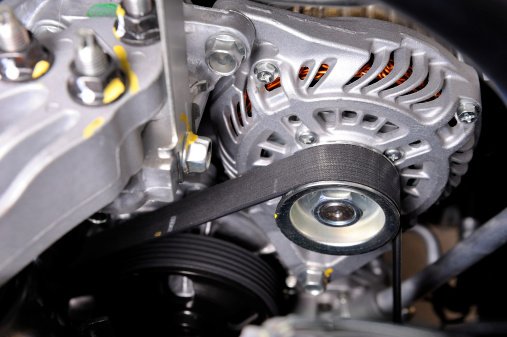
The alternator is a part of your vehicles electrical system. It works with the battery to keep your car moving and all of the lights and electrical systems running.
A lot of battery power are needed to keep your vehicle running,so much power that if not for the alternator, the battery’s power reserve would not last.
So, your vehicle’s electrical system and battery depends on well functioning alternator. When the alternator malfunctions or stops working altogether,it can mean expensive repairs, inconvenience or a car break down.
Here is a list of six warning signs to look for in order to help avoid alternator failure:
1. Dimming Headlights
The work of an alternator is to power the starter, ignition and all of the electronic accessories in your car. A dying alternator may cause the power windows and power seats to operate a more slowly than usual.
Also,you will notice your headlights and dashboard lights beginning to dim.
2. Warning light
Most modern cars have a dashboard warning light that alerts you when the alternator is malfunctioning. Usually, the light will be shaped like a battery,or you see ALT (for alternator) or GEN (for generator). This light may only trigger if you are using multiple electrical components.
3. Weak or dead battery
An alternator charges and restore power to your car battery. If the battery is really weak or dead, a faulty alternator cannot bring it back to life.
To troubleshoot whether the issue is the alternator or the battery, just charge the battery and restart the vehicle.
If the battery is weak or dead, the car will continue to run but the lights will again become dim after a short time, indicating a problem with the charging system.
If the vehicle has difficulty starting after the battery is fully charged, the problem is likely from the alternator.
4. Burning rubber smell
An alternator works in conjunction with a system of belts. If a belt is not turning freely, the excess friction will cause the belt to heat up, which produces a burning rubber smell and a lower alternator output.
5. Strange sounds
There are many different parts that spin inside your vehicle’s alternator to produce electrical current. If one of these parts becomes worn or breaks, this could cause a grinding noise.
If the bearings inside the alternator are worn-out or if the bushings that the alternator is mounted on have gone bad, a noise will be produced.
6. Visual inspection
If you are experiencing problems with the electrical system, the alternator itself might be fine because the problem could be with one of the belts connected to the alternator. Visual inspection of the engine compartment can determine if a belt is too loose,too tight, cracked or worn.
If you suspect your car may be having a problem with the alternator or is displaying any of the symptoms above, have the battery and alternator inspected by your trusted technician.

 News1 week ago
News1 week ago
 News7 days ago
News7 days ago
 Celebrities Auto1 week ago
Celebrities Auto1 week ago
 News5 days ago
News5 days ago
 News1 week ago
News1 week ago
 Concept Cars7 days ago
Concept Cars7 days ago
 News5 days ago
News5 days ago
 Celebrities Auto6 days ago
Celebrities Auto6 days ago















